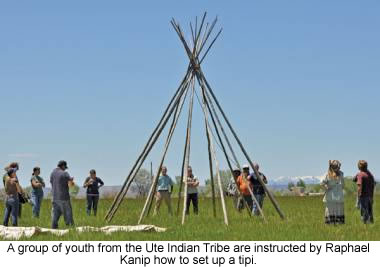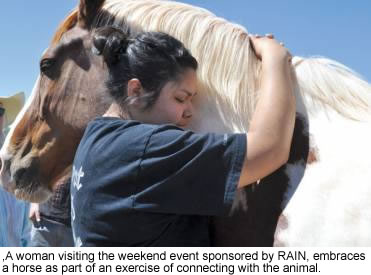 |
Canku Ota
|
 |
|
(Many Paths)
|
||
|
An Online Newsletter
Celebrating Native America
|
||
|
August
1, 2011 - Volume 9 Number 8
|
||
|
|
||
|
RAIN Encourages
Native Diet, Traditions
|
||
|
by Ranae Bangerter,
http://www.vernal.com
|
||
|
"It doesn't mean that we are returning to the blanket," said Forrest Cuch, the adviser and co-founder of Rising American Indian Nations. "It just means that we are taking the best of both worlds, combining the best of both worlds." RAIN is a non-profit organization that believes that American Indian people will rise and provide leadership to the nation, Cuch said. To help with that mission, he brought in several experts in horses, survival skills, tipi building, archery and gardening to young people during the week of June11. "We're encouraging American Indian people — primarily the Ute's at this point — to return to their native diet which includes: growing their own vegetables, preferably organic grown vegetables," he said. "But most importantly eating native foods, staying away from the grocery store, more native fruits and vegetables, including berries, more deer, elk, antelope, bison, (and getting) more exercise." RAIN planted a community garden in mid-June of beans, squash, tomatoes, Hopi corn, blue and white corn and a variety of other vegetables near 5000 East and 3000 North in Whiterocks. Executive Director of RAIN Shauna Engen said the organization will hold a monthly cookoff during harvest season. They will demonstrate how to cook with the food out of the garden, and then send people home with the ingredients. The garden is supported by donations from the Ute Indian Tribe. Cuch said he believes that teaching the younger generation about gardening, horses and other valuable skills "will take (native people) away from the negative technologies, television, the influences of alcohol and drugs and move away from those destructive influences."
"It goes beyond words," Brighton said in trying to explain how she lets students get close to horses and pet and hug them. "You have to have that experience to feel that. When you do it gives you an awareness that stays with you for the rest of your life and you look at a situation differently." Landolphy agreed about it being an experience. "I think in our society we're always thinking control first and this is connection first. Connection over control," Lanolphy said. "One of the things that we all, myself included, suffer from is utilitarianism, something has to be utilized in order to be valuable, and as opposed to just being," she said. "Just being with a horse is enough, and yet we always have to do something like ride it or it has to perform, or it has to do something. Landolphy said during that week, they were "just with them." "If we had more relationships that were less utilitarian in our own lives we would be happier," she said. Brighton agreed saying, "it's not about breaking the spirit (of the horse), it's about partnering and creating a willing relationship with the spirit." Another spiritual element was brought in with a group of survival skills teachers. Juan Villarreal, a volunteer visiting from Texas teaching survival skills, said the difference between most outdoor survival skills teachers and what he teachs is the spirituallity that exists. He said native people believe that everything on this earth is a gift from the creator and people need to give back to nature and "walk more in reverence of and appreciation of nature, that (has) been gifted to us, not to be taken for granted." He and two other survival skills teachers with 4 Elemnts Earth Education taught a group of people how to create a bow drill with sticks in the area nearby, how to build a shelter, and how to find pure water. "It's more of a spiritual connection," said founder and director of 4 Elements Rick Berry, "not fighting – but trying to blend with it." He said it's about showing reverence for the elements on the earth. Berry said if a person has to find pure water in the desert or mountains, when they come back home, "they turn the faucet on they have more reverence for it and they don't just take it for granted." An instructor with 4 Elements, Danielle Stanki said they teach people survival skills so that they can become more confident and curious about their surroundings. She said they try to encourage people to "go and find out for themselves, try something different (and) try something new." Villarreal said with the creation of new technologies it's important not to abandon them, but to incorporate them and use them to help you. He said it's a balance. "It doesn't mean learn how to do into the woods and become a hermit or anything, it's not all about that, but just teaching people to create that bond with outdoors," Villarreal said. Cuch agreed, and said that's why he brought in others, like Darren Cuch, who taught students how to use a high-tech bow for archery, Raphael Kanip to teach how to construct a tipi, and Nino Reyos to instruct youth in how to play the flute. "For us to survive and enjoy this life we need to do something really important and that is, we need to keep what is really good in our own culture and take the best of what the white man has to offer," Cuch said. "If you interpret that to today's ways, it would be avoid the alcohol and drug and pollution and the bad food and all that junk, but take the good technology, the education, the knowledge the history all the information that makes us more knowledgeable, educated people, take the best of both worlds." More information about RAIN and the community garden in Whiterocks, visit www.rainutah.org or call 801-768-4336 or email Shauna Engen at shauna@rainutah.org or call her at 801-651-0539. Forrest Cuch can be reached at 385-232-5979. |
|
|
||
|
|
||
| Canku Ota is a free Newsletter celebrating Native America, its traditions and accomplishments . We do not provide subscriber or visitor names to anyone. Some articles presented in Canku Ota may contain copyright material. We have received appropriate permissions for republishing any articles. Material appearing here is distributed without profit or monetary gain to those who have expressed an interest. This is in accordance with Title 17 U.S.C. Section 107. | ||
|
Canku Ota is a copyright ©
2000, 2001, 2002, 2003, 2004, 2005, 2006, 2007, 2008, 2009, 2010,
2011 of Vicki Barry and Paul Barry.
|
||
 |
 |
|
|
The "Canku
Ota - A Newsletter Celebrating Native America" web site and
its design is the
|
||
|
Copyright ©
1999, 2000, 2001, 2002, 2003, 2004, 2005,
2006, 2007, 2008, 2009, 2010, 2011
of Paul C. Barry.
|
||
|
All Rights Reserved.
|
||
 As
technology continues to evolve, and the Uintah Basin sees perpetual
growth in population and businesses, Ute Indian Tribe leaders are
working to bring native people back to their roots by creating a
community garden and educating people about horses, hunting, Tipi
building and survival skills.
As
technology continues to evolve, and the Uintah Basin sees perpetual
growth in population and businesses, Ute Indian Tribe leaders are
working to bring native people back to their roots by creating a
community garden and educating people about horses, hunting, Tipi
building and survival skills. Suzy
Landolphy with Red Horse Nations and Mary Lee Brighton of Windhorse
Relations instructed youth about how to bond with horses. Their
visit was not about riding the horse, but experiencing being with
the horse.
Suzy
Landolphy with Red Horse Nations and Mary Lee Brighton of Windhorse
Relations instructed youth about how to bond with horses. Their
visit was not about riding the horse, but experiencing being with
the horse.